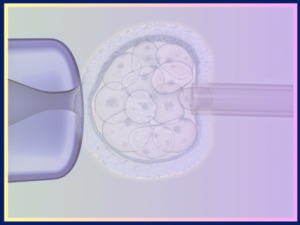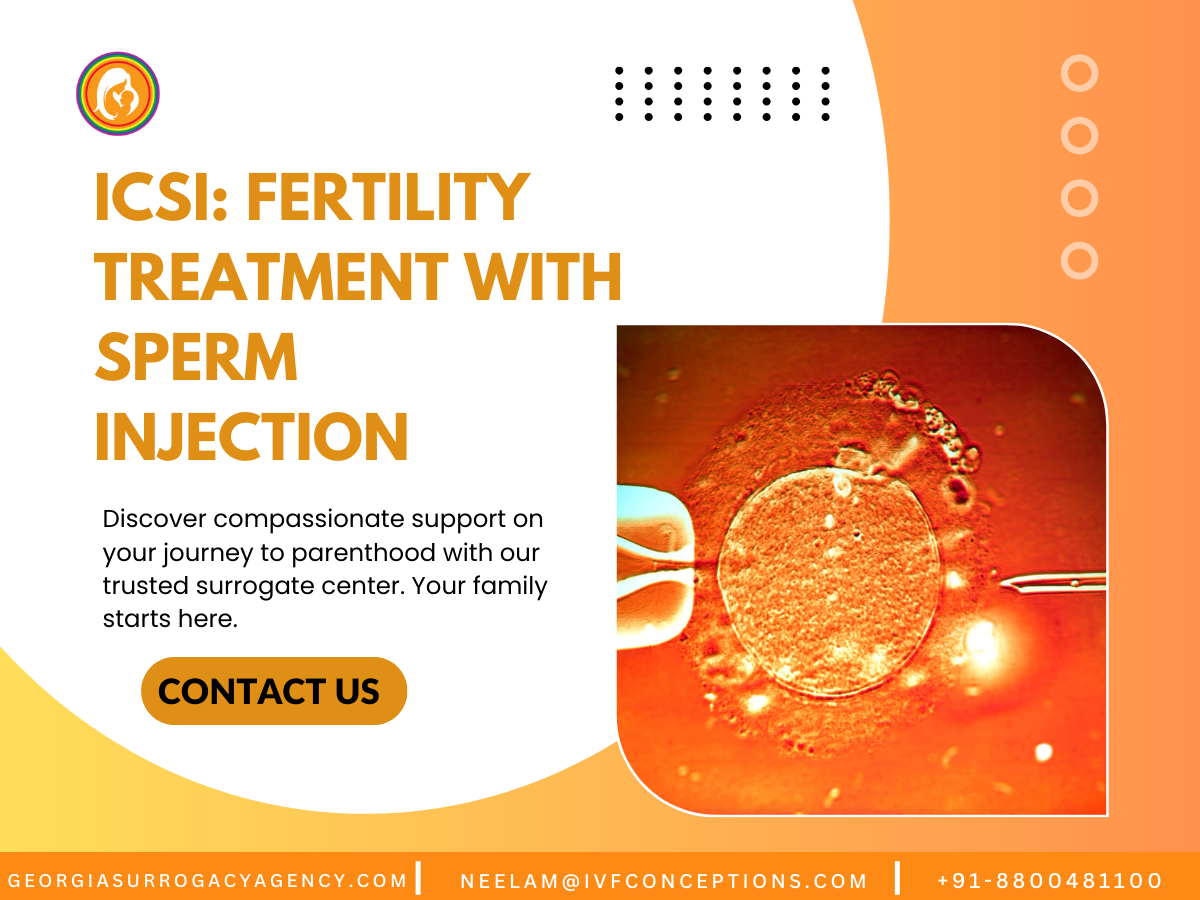ICSI: Fertility Treatment with Sperm Injection
Did you know that male infertility is a big part of infertility cases in the U.S.? This fact shows how important advanced treatments like Intracytoplasmic Sperm Injection (ICSI) are. ICSI is a special IVF method that puts a single sperm right into an egg’s center. This helps when sperm function is poor.
- Book an online appointment: Get a free online consultation.
- Call\W:+91-8800481100 Email:neelam@ivfconceptions.com
Key Takeaways
- ICSI can help couples with severe male factor infertility or previous IVF fertilization failures.
- The ICSI procedure involves directly injecting a single sperm into the egg, overcoming barriers to fertilization.
- ICSI success rates are comparable to traditional IVF, with factors like the woman’s age and infertility issues influencing pregnancy rates.
- ICSI can enhance fertilization for couples with sperm-related fertility problems and result in more embryos.
- Fertility centers with specialized training for male infertility experts see higher success rates with ICSI.
More Resources to Read:
Debunking 5 Common Myths Associated with IVF
IVF Terminology and IVF Acronym 101: A Guide
Difference Between IVF and Surrogacy: A Comprehensive Guide
IVF vs IUI: Comparing Fertility Treatment Options
Understanding ICSI: The Purpose and Process
Intracytoplasmic Sperm Injection (ICSI) is a key reproductive technology that has changed how we treat infertility. It’s a method where a single sperm is injected into a mature egg. This helps with fertilization and the growth of embryos. ICSI has greatly helped many couples start their families.
What is Intracytoplasmic Sperm Injection (ICSI)?
ICSI is a special in vitro fertilization (IVF) method for men with fertility issues. It injects a single, chosen sperm into the egg directly. This method has changed the game in assisted reproduction, helping couples succeed where traditional IVF fails.
The ICSI Procedure: Step-by-Step
The ICSI process includes these steps:
- Ovarian stimulation: The woman gets hormone shots to help her eggs develop.
- Egg retrieval: The eggs are taken from the ovaries through a small surgery.
- Sperm preparation: The man’s semen is cleaned to pick the best sperm.
- Microinjection: A special needle injects a single sperm into each egg.
- Embryo culture: The eggs are kept in the lab for fertilization and growth.
- Embryo transfer: Some embryos are put back into the woman’s uterus to try for pregnancy.
ICSI is a precise process that needs skilled embryologists and top-notch lab tools. This method helps couples with male fertility issues, with fertilization rates of 50% to 80%.
| Statistic | Value |
| ICSI fertilization rate | 50% to 80% of eggs |
| Chance of major birth defect with natural conception | 1.5% to 3% |
| Chance of single, twins, or triplets with ICSI | Same as IVF without ICSI |
| Conditions associated with ICSI (less than 1%) | Certain conditions |
| Fertilization rate at UCSF IVF lab | 70% to 80% of injected eggs |
| IVF cases involving ICSI in the Bay Area | Approximately 75% |
| Fertilization rate at UCSF IVF lab | 80% to 85% |
| Chromosomal abnormality risk with ICSI | 0.8% (4 times higher than average) |
| Egg damage during ICSI procedure | Less than 5% of eggs |
| Chromosomal abnormality risk with maternal age | Not increased with ICSI |
| Difference in embryo quality and pregnancy rates between ICSI and non-ICSI embryos | No conclusive evidence |
Who Should Consider ICSI for Fertility Treatment?

ICSI is a top choice for couples facing male infertility issues or those with low fertilization rates during IVF. This method injects a single sperm directly into the egg. This greatly boosts the chances of fertilization.
-
Male Infertility Factors Requiring ICSI
For men with abnormal semen analysis, like low sperm count, poor motility, or trouble attaching to the egg, ICSI is often the best option. It helps overcome these challenges, making fertilization more likely.
-
Other Reasons to Choose ICSI
Couples might choose ICSI if they’ve had low success with traditional IVF or have unexplained infertility. It’s also a choice for men who’ve had a vasectomy reversal. ICSI aims to increase success chances, even when not strictly needed.
| Year | Live Birth Rate for Fresh IVF & ICSI Cycles (Own Eggs) | Pregnancy Rate for Fresh IVF & ICSI Cycles (Own Eggs) |
| 2021 |
|
|
| 2022 |
|
|
Manchester Fertility’s data shows ICSI boosts ivf-icsi success, especially for male infertility or low fertilization rates. Couples should talk to a fertility expert to see if ICSI suits their male infertility treatment.
What is Intracytoplasmic Sperm Injection-ICSI for Fertility-Treatment

Intracytoplasmic Sperm Injection (ICSI) is a new way to help couples have a baby. It puts a single live sperm right into the center of an egg. This is great for couples where the man has trouble with sperm, like having few or slow-moving sperm.
ICSI is often used with in vitro fertilization (IVF). This combo helps couples beat the odds of not getting pregnant naturally. By putting the sperm directly into the egg, ICSI boosts the chance of fertilization. This leads to more healthy embryos and a better chance of a successful pregnancy.
| ICSI Procedure Timeline | Typical Duration |
| Physical Examination and Hormone Injections | 2-3 weeks |
| Egg Retrieval, Sperm Collection, and Embryo Culture | 1-2 weeks |
| Embryo Transfer | 1-2 days |
| Total ICSI Treatment Duration | 4-6 weeks |
The fertilization success rates of ICSI are very high. This makes it a top choice for fertility treatments. It helps people with different infertility issues, like women with endometriosis or men with low sperm count. It also helps those over 35 with low egg quality and those who’ve had failed IVF or IUI before.
Potential Risks and Benefits of ICSI
ICSI has changed the game for couples facing male infertility. But, it’s key to know the risks. A small number of eggs (less than 5%) might get damaged by the needle. There’s also a chance of chromosomal issues in the X or Y chromosomes.
This could lead to miscarriage, heart problems, and learning issues in kids. Some research hints at a link between ICSI and developmental delays in children. But, the proof is still out.
Couples thinking about ICSI should talk openly with their doctor about these risks associated with ICSI, chromosomal abnormalities, developmental delays, and birth defects.
Risks Associated with ICSI
- Possible damage to eggs during the ICSI procedure, leading to lower fertilization rates or poor embryonic development
- Slightly increased risk of chromosomal abnormalities, including in the X or Y chromosomes, which can result in miscarriage, heart problems, and potential behavioral or learning disabilities
- Potential link to a higher risk of developmental delays in children, although the evidence is inconclusive
ICSI also has big benefits like better fertilization rates and the chance to pick healthy sperm. It helps couples keep a genetic link to their child. Talking with your doctor is crucial to decide if ICSI is right for you.
| Potential Risks | Potential Benefits |
| Possible egg damage during ICSI procedure | Higher fertilization rates compared to traditional IVF |
| Slightly increased risk of chromosomal abnormalities | Ability to select healthy-looking sperm for injection |
| Potential link to higher risk of developmental delays | Opportunity for couples to maintain a genetic link to their offspring |
More Resources to Read:
IVF Egg Donation in Georgia Country: A Guide
Surrogacy vs IVF: Understanding the Key Differences
IVF Treatment in Georgia: What You Need to Know?
Female Infertility Causes Symptoms And Treatments
Conclusion
Intracytoplasmic Sperm Injection (ICSI) is a key fertility treatment for couples with male infertility. It injects a single sperm directly into the egg. This method helps many couples who couldn’t get pregnant before.
ICSI has become more popular over time. It’s used more for both male and non-male infertility issues. Even though it has some risks, like a higher chance of chromosomal problems and delays, it has helped many couples have children.
Studies show that ICSI might not always be better than traditional IVF, especially for non-male infertility cases. But for those with male infertility, ICSI is still a good choice. It can increase the chances of fertilization and a successful pregnancy. As fertility treatments get better, ICSI will likely play an even bigger role in helping people start families.
Our team has over 14 years of experience facilitating surrogacy arrangements, egg donation, and serving as an advocacy resource for infertile couples and LGBTQ individuals seeking to build families. Till now we have helped and supported thousands of the intended parents with their family-building journey, and we can help you as well. Happy to share the references from the past IPs if needed.
If you’d like to learn more about IVF, Egg Donation, or surrogacy services globally, check out the rest of our website at Georgia Surrogacy Agency. We offer legally secure and affordable surrogacy consulting services for FREE.
Get in touch for FREE SURROGACY CONSULTING:
Mobile: +91-8800481100 ( WhatsApp, Line, Viber)
Email: neelam@ivfconceptions.com
FAQs for Intracytoplasmic Sperm Injection (ICSI)
What is Intracytoplasmic Sperm Injection (ICSI)?
ICSI is a way to help with fertility issues. It involves putting a single live sperm into a human egg to help it fertilize. This method is used when men have trouble making sperm.
How does the ICSI procedure work?
First, the woman gets treatments to make several eggs mature. Then, these eggs are taken out and kept in a lab. Next, the sperm is cleaned up to remove dead sperm.
After that, an expert puts one live sperm into each egg with a special needle.
Who should consider ICSI for fertility treatment?
ICSI is a good option for men with low sperm count or poor sperm movement. It’s also for those who have trouble with sperm sticking to the egg. Some choose it if they’ve had bad results with IVF before or if the man has had a vasectomy.
What are the potential risks associated with ICSI?
A few eggs might get damaged by the needle during ICSI. There’s a small chance of chromosomal issues in the baby, which could lead to health problems. Some studies suggest a link to developmental delays in kids, but it’s not clear.
What are the benefits of ICSI for fertility treatment?
ICSI is a strong method for overcoming male infertility. It helps couples with low chances of getting pregnant. By directly putting a sperm into the egg, it overcomes many fertilization barriers.
Source Links
- ICSI: Intracytoplasmic Sperm Injection | Atlanta Center for Reproductive Medicine
- Intracytoplasmic Sperm Injection (ICSI) | Barnes-Jewish Hospital
- ICSI Key Findings | Assisted Reproductive Technology (ART)
- What is ICSI? patient education fact sheet
- FAQ: Intracytoplasmic Sperm Injection
- What is IVF, ICSI & IUI? And Which is the Best Option?

Highly esteemed, authoritative, and trusted professional with a 14-year of experience in international surrogacy. Advocate for Secure, Legal, and Affordable International Surrogacy.
Neelam Chhagani, MA (Counselling Psychology) and Holistic Infertility and Third-Party Reproduction Consultant.
Member of European Fertility Society, Best Surrogacy Blogger of 2020, with 300 dedicated blogs, and top contributor on Quora for Surrogacy.


Add Your Comment